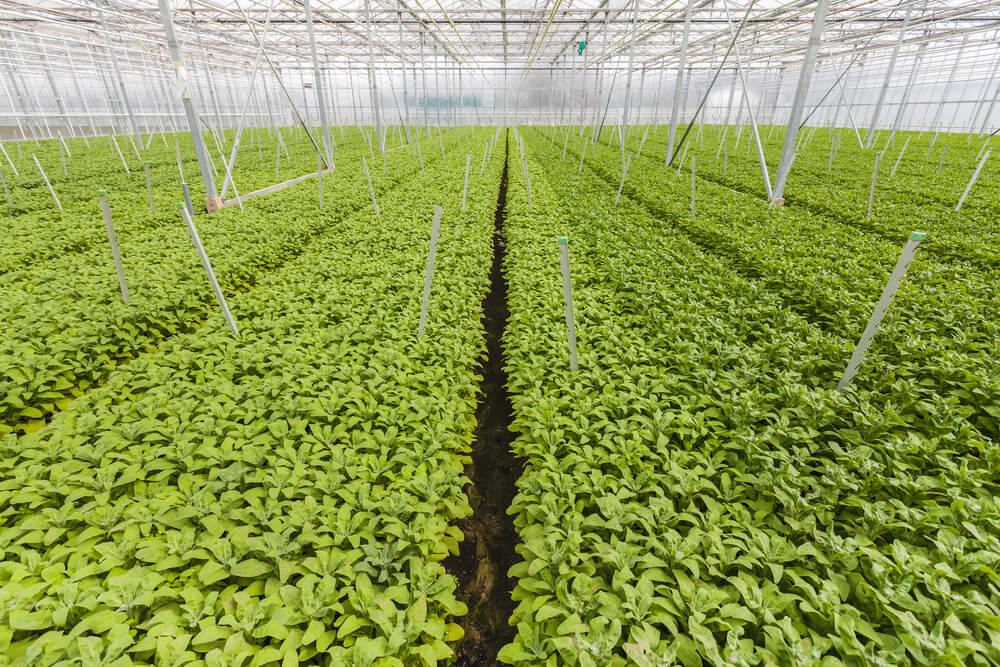
1: the cultivation or growth of a single crop or organism especially on agricultural or forest land
2: a crop or a population of a single kind of organism grown on land in monoculture
3: a culture dominated by a single element: a prevailing culture marked by homogeneity
Monoculture is the agricultural practice of producing or growing a single crop or plant species over a wide area and for a large number of consecutive years.
It is the most popular use of modern industrial farming in our world today. Monoculture farming has two simple goals: large harvests with minimal labor, thus maximizing profits.
Studies for decades now have shown that monocultures lead to the quicker spread of diseases, because a uniform crop is more susceptible to pathogens. 'Crop monoculture' is the practice of growing the same crop year after year.
Monoculture is also frequently used to describe the raising of one species of livestock in a factory farm, such as hogs, cattle, or chickens, or even in fields other than agriculture to describe any group dominated by a single variety.
Monocultures used in agriculture are usually single strains that have been bred for high yield and resistant to certain common diseases. Since all plants in a monoculture are genetically similar, if a disease strikes to which they have no resistance, it can destroy entire populations of crops. When antibiotics and pesticides are used frequently to combat disease in these monocultures, what we get is not only food tainted with the drugs, the pathogens, overtime, develop resistances to the chemicals. In turn, the animals produced in these monocultures remain sick and pass onto humans sicknesses, too. This is why we have had so many food recalls in the past decades.
The fertilizers and herbicides used in these monocultures have washed into our local water systems, lakes, gulfs, seas and oceans. In the Gulf regions, for example, creations of "dead zones" along the shore lines that amounts to 6600 square miles have been tainted with chemicals that kill and poison all live creatures. In turn, marine life struggle to survive and many creatures are on the verge of being not only endangered, but their DNA is changing and their reproductive organs are shutting down.
When farmers of monocultures fail to regularly aerating the soil for water to reach root systems, or when they till the land too frequently to maximize harvest turnover, the soil becomes less readily available for other crop rotation, and over time our fruits and vegetables are being produced with less vitamins and minerals because of poor soil quality. When produce production slows, America tends to turn to foreign countries for year round produce in demand. Though this may sound like a practice that is generating international commerce, it is really scary for the consumer because every country has their own standards (or lack of) applied to their farm and agricultural practices. Mexico and other neighboring countries, for example, use stronger and far more pesticides on their produce than those allotted in the United States. The fact that these products will have to be transported, sometimes more than 3,000 miles, also takes a toll on our Mother Earth, for we are creating a larger carbon foot print.
Aside from global awareness, we need to move toward another type of agricultural movement: polyculture, which is the mixing of different crops. Polyculture has natural variations and a great likelihood that one or more of the crops will be resistant to any particular pathogen. Studies have shown planting a mixture of crop strains in the same field to be effective at combating disease. Many local, organic, “green” farms are now realizing the importance of polycultures, not just to our own health, but to the benefit of the animals, plants, and mother earth.
Great resources for further learning:
1. FRESH (DVD) celebrates the farmers, thinkers and business people across America who are re-inventing our food system. Each has witnessed the rapid transformation of our agriculture into an industrial model, and confronted the consequences: food contamination, environmental pollution, depletion of natural resources, and morbid obesity. Forging healthier, sustainable alternatives, they offer a practical vision for a future of our food and our planet.
Synopsis and other great DVD and books provided by: http://www.freshthemovie.com/resources/fresh-book-dvd-picks/
2. Monoculture, written by FS Michaels draws on extensive research to make surprising connections among disciplines to take a big-picture look at how one story is changing everything. Her research and writing have been supported by the Social Sciences and Humanities Research Council of Canada, the Killam Trusts, and regional and municipal arts councils. 'http://www.amazon.com/Monoculture-How-Story-Changing-Everything/dp/0986853801/ref=sr_1_1?ie=UTF8&qid=1341869294&sr=8-1&keywords=monoculture
